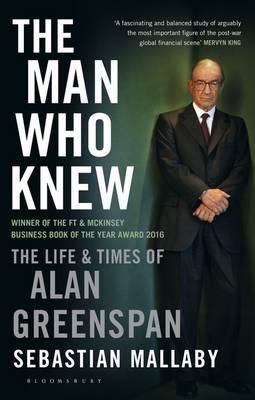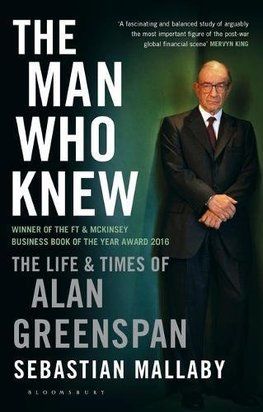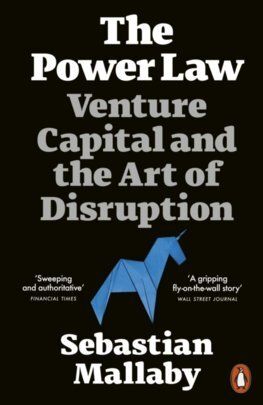Sebastian Mallaby
autor
More Money than God
Wealthy, powerful, and potentially dangerous, hedge-find managers have emerged as the stars of twenty-first century capitalism. Based on unprecedented access to the industry, "More Money Than God" provides the first authoritative history of hedge funds. This is the inside story of their origins in the 1960s and 1970s, their explosive battles with central banks in the 1980s and 1990s, and finally their role in the financial crisis of 2007-9. Hedge funds reward risk takers, so they tend to attract larger-than-life personalities. Jim Simons began life as a code-breaker and mathematician, co-authoring a paper on theoretical geometry that led to breakthroughs in string theory. Ken Griffin started out trading convertible bonds from his Harvard dorm room. Paul Tudor Jones happily declared that a 1929-style crash would be 'total rock-and-roll' for him. Michael Steinhardt was capable of reducing underlings to sobs. 'All I want to do is kill myself,' one said. 'Can I watch?' Steinhardt responded. A saga of riches and rich egos, this is also a history of discovery. Drawing on insights from mathematics, economics and psychology to crack the mysteries of the market, hedge funds have transformed the world, spawning new markets in exotic financial instruments and rewriting the rules of capitalism. And while major banks, brokers, home lenders, insurers and money market funds failed or were bailed out during the crisis of 2007-09, the hedge-fund industry survived the test, proving that money can be successfully managed without taxpayer safety nets. Anybody pondering fixes to the financial system could usefully start here: the future of finance lies in the history of hedge funds.
Vypredané
12,83 €
13,50 €
The Man Who Knew
WINNER OF THE 2016 FT & McKINSEY BUSINESS BOOK OF THE YEAR AWARD, this is the biography of one of the titans of financial history over the last fifty years. Born in 1926, Alan Greenspan was raised in Manhattan by a single mother and immigrant grandparents during the Great Depression but by quiet force of intellect, rose to become a global financial 'maestro'. Appointed by Ronald Reagan to Chairman of the Federal Reserve, a post he held for eighteen years, he presided over an unprecedented period of stability and low inflation, was revered by economists, adored by investors and consulted by leaders from Beijing to Frankfurt. Both data-hound and eligible society bachelor, Greenspan was a man of contradictions. His great success was to prove the very idea he, an advocate of the Gold standard, doubted: that the discretionary judgements of a money-printing central bank could stabilise an economy. He resigned in 2006, having overseen tumultuous changes in the world's most powerful economy. Yet when the great crash happened only two years later many blamed him, even though he had warned early on of irrational exuberance in the market place. Sebastian Mallaby brilliantly shows the subtlety and complexity of Alan Greenspan's legacy. Full of beautifully rendered high-octane political infighting, hard hitting dialogue and stories, The Man Who Knew is superbly researched, enormously gripping and the story of the making of modern finance.
Vypredané
34,15 €
35,95 €
The Man Who Knew - The Life and Times of Alan Greenspan
The definitive biography of the most important economic statesman of our time Sebastian Mallaby's magisterial biography of Alan Greenspan, the product of over five years of research based on untrammeled access to his subject and his closest professional and personal intimates, brings into vivid focus the mysterious point where the government and the economy meet. To understand Greenspan's story is to see the economic and political landscape of the last 30 years--and the presidency from Reagan to George W. Bush--in a whole new light. As the most influential economic statesman of his age, Greenspan spent a lifetime grappling with a momentous shift: the transformation of finance from the fixed and regulated system of the post-war era to the free-for-all of the past quarter century. The story of Greenspan is also the story of the making of modern finance, for good and for ill. Greenspan's life is a quintessential American success story: raised by a single mother in the Jewish émigré community of Washington Heights, he was a math prodigy who found a niche as a stats-crunching consultant. A master at explaining the economic weather to captains of industry, he translated that skill into advising Richard Nixon in his 1968 campaign. This led to a perch on the White House Council of Economic Advisers, and then to a dazzling array of business and government roles, from which the path to the Fed was relatively clear. A fire-breathing libertarian and disciple of Ayn Rand in his youth who once called the Fed's creation a historic mistake, Mallaby shows how Greenspan reinvented himself as a pragmatist once in power. In his analysis, and in his core mission of keeping inflation in check, he was a maestro indeed, and hailed as such. At his retirement in 2006, he was lauded as the age's necessary man, the veritable God in the machine, the global economy's avatar. His memoirs sold for record sums to publishers around the world. But then came 2008. Mallaby's story lands with both feet on the great crash which did so much to damage Alan Greenspan's reputation. Mallaby argues that the conventional wisdom is off base: Greenspan wasn't a naive ideologue who believed greater regulation was unnecessary. He had pressed for greater regulation of some key areas of finance over the years, and had gotten nowhere. To argue that he didn't know the risks in irrational markets is to miss the point. He knew more than almost anyone; the question is why he didn't act, and whether anyone else could or would have. A close reading of Greenspan's life provides fascinating answers to these questions, answers whose lessons we would do well to heed. Because perhaps Mallaby's greatest lesson is that economic statesmanship, like political statesmanship, is the art of the possible. The Man Who Knew is a searching reckoning with what exactly comprised the art, and the possible, in the career of Alan Greenspan.
Vypredané
24,65 €
25,95 €
The Man Who Knew
WINNER OF THE 2016 FT & McKINSEY BUSINESS BOOK OF THE YEAR AWARD, this is the biography of one of the titans of financial history over the last fifty years.
Born in 1926, Alan Greenspan was raised in Manhattan by a single mother and immigrant grandparents during the Great Depression but by quiet force of intellect, rose to become a global financial 'maestro'. Appointed by Ronald Reagan to Chairman of the Federal Reserve, a post he held for eighteen years, he presided over an unprecedented period of stability and low inflation, was revered by economists, adored by investors and consulted by leaders from Beijing to Frankfurt.
Both data-hound and eligible society bachelor, Greenspan was a man of contradictions. His great success was to prove the very idea he, an advocate of the Gold standard, doubted: that the discretionary judgements of a money-printing central bank could stabilise an economy. He resigned in 2006, having overseen tumultuous changes in the world's most powerful economy. Yet when the great crash happened only two years later many blamed him, even though he had warned early on of irrational exuberance in the market place.
Sebastian Mallaby brilliantly shows the subtlety and complexity of Alan Greenspan's legacy. Full of beautifully rendered high-octane political infighting, hard hitting dialogue and stories, The Man Who Knew is superbly researched, enormously gripping and the story of the making of modern finance.
Vypredané
20,85 €
21,95 €
The Power Law
Innovations rarely come from "experts." Jeff Bezos was not a bookseller; Elon Musk was not in the auto industry. When it comes to innovation, a legendary venture capitalist told Sebastian Mallaby, the future cannot be predicted, it can only be discovered. Most attempts at discovery fail, but a few succeed at such a scale that they more than make up for everything else. That extreme ratio of success and failure is the power law that drives venture capital, Silicon Valley, the tech sector, and, by extension, the world.
Drawing on unprecedented access to the most celebrated venture capitalists of all time, award-winning financial historian Sebastian Mallaby tells the story of this strange tribe of financiers who have funded the world's most successful companies, from Google to SpaceX to Alibaba. With a riveting blend of storytelling and analysis, The Power Law makes sense of the seeming randomness of success in venture capital, an industry that relies, for good and ill, on gut instinct and personality rather than spreadsheets and data. We learn the unvarnished truth about some of the most iconic triumphs and infamous disasters in the history of tech, from the comedy of errors that was the birth of Apple to the venture funding that fostered hubris at WeWork and Uber to the industry's notorious lack of women and ethnic minorities.
Now the power law echoes around the world: it has transformed China's digital economy beyond recognition, and London is one of the top cities for venture capital investment. By taking us so deeply into the VCs' game, The Power Law helps us think about our own future through their eyes.
Vypredané
18,95 €
19,95 €
The Power Law
From an award-winning financial historian comes the gripping, character-driven story of venture capital and the world it made
Innovations rarely come from "experts." Jeff Bezos was not a bookseller; Elon Musk was not in the auto industry. When it comes to innovation, a legendary venture capitalist told Sebastian Mallaby, the future cannot be predicted, it can only be discovered. Most attempts at discovery fail, but a few succeed at such a scale that they more than make up for everything else. That extreme ratio of success and failure is the power law that drives venture capital, Silicon Valley, the tech sector, and, by extension, the world.
Drawing on unprecedented access to the most celebrated venture capitalists of all time, award-winning financial historian Sebastian Mallaby tells the story of this strange tribe of financiers who have funded the world's most successful companies, from Google to SpaceX to Alibaba. With a riveting blend of storytelling and analysis, The Power Law makes sense of the seeming randomness of success in venture capital, an industry that relies, for good and ill, on gut instinct and personality rather than spreadsheets and data. We learn the unvarnished truth about some of the most iconic triumphs and infamous disasters in the history of tech, from the comedy of errors that was the birth of Apple to the venture funding that fostered hubris at WeWork and Uber to the industry's notorious lack of women and ethnic minorities.
Now the power law echoes around the world: it has transformed China's digital economy beyond recognition, and London is one of the top cities for venture capital investment. By taking us so deeply into the VCs' game, The Power Law helps us think about our own future through their eyes.








